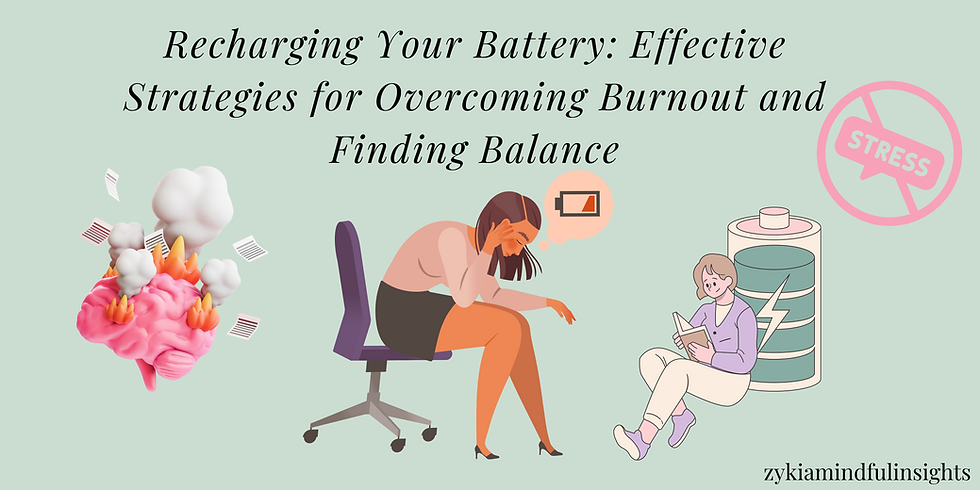Breaking the Cycle of Generational Trauma
- Zykia Hannah

- Feb 14, 2024
- 7 min read
Breaking the cycle of generational trauma involves acknowledging it, seeking therapy or counseling, practicing self-care, setting healthy boundaries, and fostering positive relationships. It often requires deep introspection, healing, and actively choosing to create a new, healthier patterns for yourself and future generations. Therapy, support groups, and other resources can be invaluable in this journey.

What is Generational Trauma?
Generational trauma refers to the transmission of trauma and its effects from one generation to another. This can happen through various mechanisms, including the passing down of harmful behaviors, coping mechanisms, and unresolved emotional wounds. It often results from significant historical events, such as war, genocide, slavery, or systemic oppression, which can impact entire communities or populations for generations.
What causes Generational Trauma?
Generational trauma can stem from various sources, including historical events, societal structures, and family dynamics. Historical events such as wars, genocides, colonization, and forced migrations can inflict trauma on entire populations, leaving lasting scars that are passed down through generations. For example, descendants of Holocaust survivors may carry the trauma of their ancestors' experiences, even it they did not directly witness or experience the events themselves. Similarly, systemic oppression, discrimination, and racism can create ongoing trauma within marginalized communities, perpetuating cycles of trauma across generations.
Societal structures and policies can also contribute to generational trauma. For instance, policies that disproportionately affect certain communities, such as mass incarceration or forced assimilation, can perpetuate trauma and lead to intergenerational transmission of adverse experiences. Additionally, family dynamics and parenting styles influenced by past trauma can contribute to the perpetuation of generational trauma. Children raised in environments where caregivers struggle with unresolved trauma may inherit maladaptive coping mechanisms and relational patterns, further perpetuating the cycle of trauma within the family unit.
"Breaking the cycle of generational trauma requires courage, compassion, and a commitment to healing. It's about recognizing the patterns of the past, understanding their impact, and choosing a different path forward for ourselves and future generations."
Acknowledging the Pattern:
The first step in breaking the cycle of generational trauma in acknowledging its existence. This involves recognizing the ways in which past traumas have influenced one's life and understanding how they may be impacting current behaviors, beliefs, and relationships. By acknowledging the pattern, individuals can begin to unravel its grip on their lives and pave the way for healing and growth.
Seeking support and Therapy:
Seeking support from therapists, counselors, or support groups can be instrumental in breaking the cycle of generational trauma. Therapy provides a safe space for individuals to explore their experiences, process their emotions, and develop coping strategies. Through therapy, individuals can gain insight into how past traumas have shaped their lives and learn healthier ways of coping with their emotions and relationships.
Practicing Self-Care:
Practicing self-care is essential in breaking the cycle of generational trauma. This involves prioritizing one's physical, emotional, and mental well-being through activities such as exercise, meditation, hobbies, and spending time with loved ones. Self-care helps individuals build resilience, manage stress, and cultivate a sense of empowerment and agency in their lives.
Setting Healthy Boundaries:
Setting healthy boundaries is crucial in breaking the cycle of generational trauma. This involves recognizing and honoring one's own needs, limits, and values, and communicating them assertively to others. By setting boundaries, individuals can protect themselves from toxic or harmful dynamics, assert their autonomy, and create healthier relationships based on mutual respect and trust.
Fostering Positive Relationships:
Fostering positive relationships with supportive friends, family members, or mentors is key in breaking the cycle of generational trauma. Positive relationships provide individuals with validation, empathy, and encouragement, helping them feel seen, heard, and valued. By surrounding themselves with people who uplift and inspire them, individuals can create a supportive network that reinforces their healing journey and empowers them to break free from the chains of generational trauma.
How to you break a generational trauma?
Breaking generational trauma involves several steps:
1. Acknowledgment: Recognize that generational trauma exists within your family or community. Understand how it has impacted you and previous generations.
2. Seek Therapy: Consider therapy or counseling to address the trauma. A professional can help you process emotions, develop coping mechanisms, and create strategies for healing.
3. Educate Yourself: Learn about the origins and effects of generational trauma. Understanding the historical context can provide insight into your experiences and behaviors.
4. Practice Self-Care: Take care of your physical, emotional, and mental well-being. Engage in activities that promote relaxation, mindfulness, and self-compassion.
5. Set Boundaries: Establish healthy boundaries with family members or others who perpetuate toxic dynamics. This may involve limiting contact or asserting your needs and values.
6. Seek Support: Surround yourself with supportive friends, family, or community members who understand your journey and can provide encouragement and validation.
7. Break the Cycle: Make conscious efforts to break patterns of behavior or thought that contribute to the cycle of trauma. Challenge negative beliefs and replace them with positive, empowering ones.
8. Create New Traditions: Establish new traditions and rituals that promote healing, resilience, and connection within your family or community.
9. Advocate for Change: Work towards addressing systemic issues that contribute to generational trauma, such as inequality, discrimination, and injustice. Get involved in advocacy efforts that promote social justice and equality.
10. Be Patient and Persistent: Healing from generational trauma is a journey that takes time and effort. Be patient with yourself and others, and remain committed to the process of healing and growth.
11. Parent Differently: Parenting is hard and stressful. In addition, if you've never experienced a healthy parent-child relationship, you may not know what it looks like or how to build it with your child. When stressed, we tend to parent how we were raised. So, to break the trauma cycle, we must parent differently.
How to heal from generational trauma?
Healing from generational trauma is a multifaceted process that involves self-awareness, self-care, and seeking support. Here are some steps to consider:
1. Acknowledge the Trauma: Recognize that generational trauma exists within your family or community. Understand how it has affected previous generations and how it may be impacting you.
2. Seek Professional Help: Consider therapy or counseling with a qualified mental health professional who specializes in trauma. Therapy can provide a safe space to explore your experiences, process emotions, and develop coping strategies.
3. Practice Self-Compassion: Be gentle and kind to yourself as you navigate the healing process. Acknowledge your strengths and resilience, and give yourself permission to feel and express your emotions without judgment.
4. Learn Coping Skills: Explore different coping mechanisms that can help you manage stress, anxiety, and other symptoms of trauma. This may include mindfulness techniques, relaxation exercises, and grounding exercises.
5. Connect with Supportive Relationships: Surround yourself with supportive friends, family members, or community members who understand your experiences and can provide empathy and validation. Building connections with others can be a powerful source of healing and resilience.
6. Engage in Self-Care: Take care of your physical, emotional, and mental well-being through activities that promote relaxation, joy, and fulfillment. This may include exercise, hobbies, spending time in nature, or engaging in creative expression.
7. Set Boundaries: Establish healthy boundaries with individuals or situations that trigger or exacerbate your trauma symptoms. This may involve limiting contact with toxic relationships or environments and prioritizing your own needs and well-being.
8. Explore Healing Modalities: Consider exploring alternative healing modalities such as yoga, meditation, acupuncture, or art therapy. These practices can help you reconnect with your body, regulate your emotions, and cultivate a sense of peace and balance.
9. Educate Yourself: Learn more about generational trauma and its effects on individuals and communities. Understanding the historical and social context of your experiences can provide insight and validation as you work towards healing.
10. Celebrate Your Progress: Celebrate small victories and milestones along your healing journey. Recognize the courage and resilience it takes to confront and overcome generational trauma, and give yourself credit for your progress.
"Each generation has the power to rewrite its story, to break free from the chains of the past, and to create a legacy of healing and resilience."
Signs to Watch Out For:
Avoidance of certain situations without legitimate reasoning.
Denial over events that have occurred in the past.
Have problems with alcohol or drug abuse.
Unexplained anxiety and hyper vigilance.
Tend to mistrust other people.
Generational Trauma in Communities:
Generational trauma in communities refers to the collective impact of historical or systemic trauma experienced by a group of people over multiple generations. This type of trauma can affect entire communities, shaping their cultural norms, social dynamics, and overall well-being. Examples of generational trauma in communities include the intergenerational effects of slavery, colonization, and forced migration, genocide, discrimination and systemic oppression.
Communities impacted by generational trauma often exhibit patterns of adversity, such as higher rates of mental health disorders, substance abuse, poverty, violence, and social inequality. These patterns can perpetuate over time as trauma is passed down through family systems, cultural practices, and societal structures. Additionally, generational trauma can undermine community cohesion, trust, and resilience, making it challenging for affected groups to heal and thrive.
Addressing generational trauma in communities requires a comprehensive approach that recognizes the historical and systemic factors contributing to the trauma while also empowering individuals and communities to heal and rebuild. This may involve initiatives such as trauma-informed care, culturally sensitive mental health services, community-based healing programs, and efforts to address social and economic disparities. By acknowledging and addressing generational trauma, communities can work towards healing, resilience, and collective empowerment.
"Breaking the cycle of generational trauma requires us to confront the wounds of the past, heal our present, and sow the seeds of hope for future generations."
In closing, breaking the cycle of generational trauma is a journey of courage, compassion, and resilience. It involves acknowledging the patterns of the past, seeking support, practicing self-care, setting boundaries, fostering positive relationships, and working towards healing on both individual and community levels. By confronting the legacy of trauma with empathy and determination, we can create a future defined by healing, strength, and collective empowerment for ourselves and generations to come.
You have made it to the end. Thank you all for reading today's post. I just want to let you all know that you're loved and you're important. Thank you all for loving my blog and i just want you all to know that i love each and everyone of you🤍.
🫧Quote of the day:
"In breaking the cycle of generational trauma, we reclaim our power, rewrite our narrative, and forge a path of resilience and healing for ourselves and those who follow." 🤍




Comments